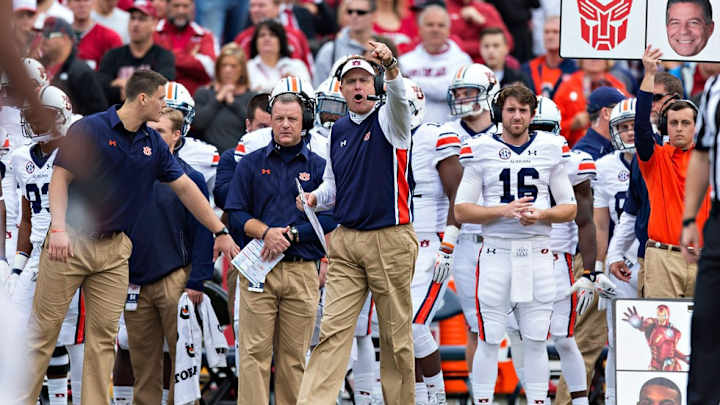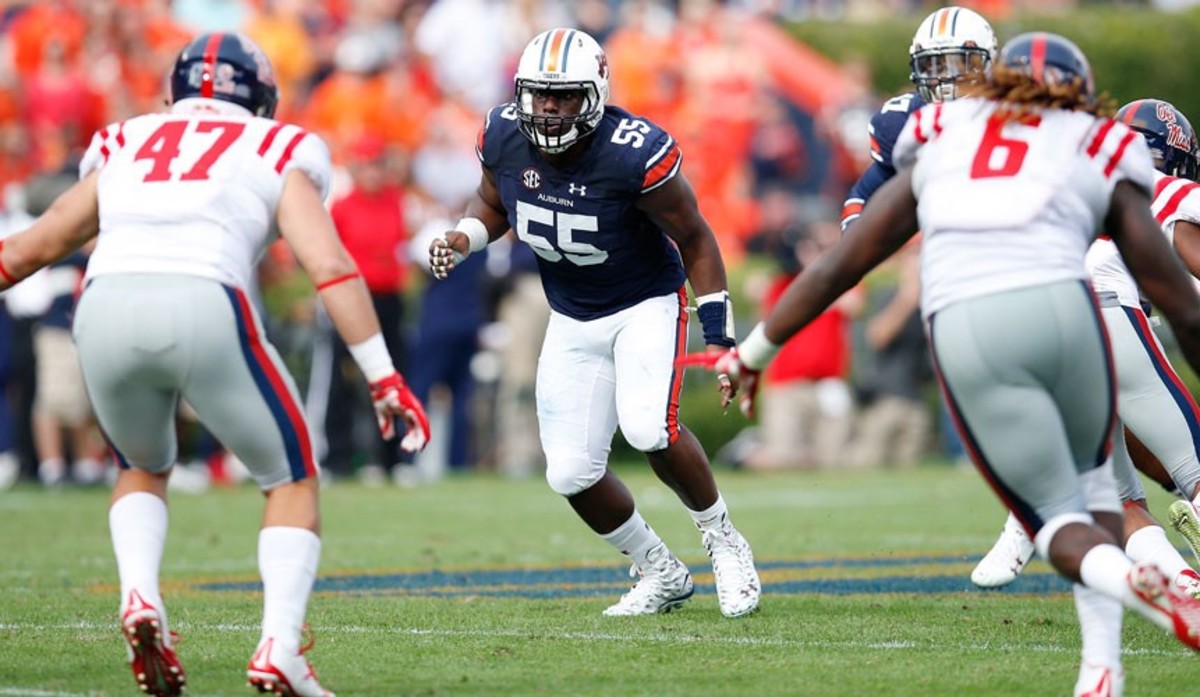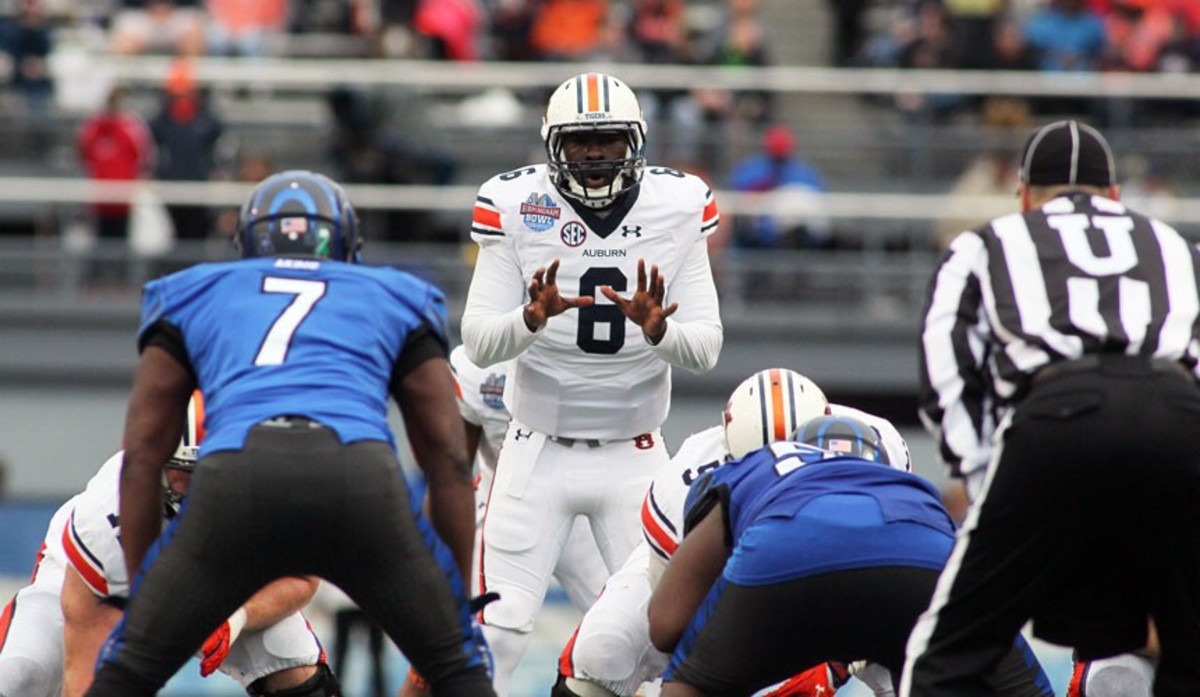Pressure on the Plains? Auburn's 2016 hopes depend on Gus Malzahn finding the answer at quarterback

[video: 13724921]
AUBURN, Ala. — Had the same words come out of Will Muschamp's mouth last spring instead of Kevin Steele's this week, they would have inspired joy instead of dread. Context, as always, remains critical.
"We're keeping things underneath us," Steele, Auburn's third defensive coordinator in three years, said Tuesday. "Probably the biggest thing I have noticed, if you had seen the scrimmage Saturday, was the ability to control snap after snap after snap the explosive plays. We just didn't let things get out deep on us or long on us. If you do that in this league, you've got a chance."
A year ago, when Muschamp was installing his defense and we idiot sportswriters were predicting runaway success for the Tigers, such a statement would have inspired a response like this: Wooooooooooo! If our defense can stop OUR offense, it can stop anybody. Start printing those SEC championship T-shirts now.
Now, with fourth-year Auburn coach Gus Malzahn on the ropes after going 2–6 in SEC play with an offense that seemed stuck in mud, Steele's words probably prompt a response that sounds something like this: Our offense can't even manage an explosive play against OUR defense. We might go three-and-out on every possession in the Iron Bowl.
The truth probably lies somewhere in between those two exclamations. No one is predicting an SEC title for the Tigers, which is understandable given their struggles on both sides of the ball last season. However, the team's 2016 defense is intriguing with a healthy Carl Lawson—a rising senior who will play in a spring game for the first time in his college career on Saturday—leading a deep line that should be capable of throwing fresh and fast players at opposing offenses. The linebackers and secondary are mostly unproven, but a deep, talented front can make the players behind it look better.

Joe Robbins/Getty Images
Still, since this is a Malzahn team, success will depend mostly on the offense. More specifically, it will depend on the success of the quarterback. Malzahn has remained tight-lipped about the progress of the three-man race to run his offense, but all three quarterbacks will make their case on Saturday at Jordan-Hare Stadium. What Malzahn decides after that may ultimately determine how long he remains at Auburn.
The idea of a coach being on the hot seat 27 months after he played for the national title to end his first season seems ludicrous, but remember, this is the program that fired Malzahn's predecessor, Gene Chizik, 22 months after he won the national championship in his second season. The Auburn family wants what it wants, and it wants it now. No SEC West coach has been fired—though LSU's Les Miles came close—since the last of them joined the $4 million-per-year club last off-season. Fan bases want titles for that kind of investment, and Alabama coach Nick Saban has a stranglehold on those. Since the Auburn coach must always be judged side-by-side with the Alabama coach, either Malzahn must move toward SEC title contention or Saban can hang Malzahn's buyout on his wall.
To move in the direction that keeps him on the Plains, Malzahn must choose the correct quarterback—if there is a correct choice on Auburn's roster. His options are the two players he used last season or a junior college transfer who began his career at Florida State. There is also a wrinkle. One of those quarterbacks might have other options himself, and he might force Malzahn to tip his hand or make a decision before he's ready. There is never a shortage of drama here, and this particular predicament will send everyone watching the spring game hunting for the hidden meaning in each play call and result.
It wasn't supposed to come to this. The Tigers were supposed to comfortably enter year two of the Jeremy Johnson era and build off a successful 2015 campaign. That's what Malzahn expected when he anointed Johnson the starting quarterback after last spring. The usually reticent Malzahn couldn't hide his excitement for the 6' 5", 240-pounder he began recruiting as an eighth-grader. Because Malzahn, who rarely goes out on a limb, seemed so certain about Johnson, we in the media bought in and spread the word. Malzahn had never coached a bad offense at the college level—his always outpunched its weight—so it felt easy to trust his judgment. That produced an avalanche of expectations for which Johnson wasn't prepared. Before a 17–9 loss to Mississippi State in Week 4, Malzahn benched Johnson in favor of backup Sean White. Johnson's confidence seemed shot, and he and White traded the job with little success for the rest of the season. The Tigers, who averaged 6.8 yards per play from 2013–14, fell to 5.4 yards per play in '15. Only Marshall (–2.2) and Wisconsin (–1.5) saw their yards-per-play averages drop more from '14 to '15 than Auburn (–1.3).
This spring Johnson and White are competing against juco transfer John Franklin III for the starting job. Franklin began his career at Florida State but left for East Mississippi Community College when it became apparent he wouldn't be tapped to succeed Jameis Winston in 2015. (It was more likely he would have been asked to play receiver had he stayed in Tallahassee.) As a redshirt freshman at Florida State, Franklin was tasked with emulating Auburn quarterback Nick Marshall as the Seminoles prepared to face the Tigers in the final BCS title game. Now, the Tigers hope Franklin can do a Marshall impression that lasts two seasons.
Malzahn learned his lesson last year and has declined to offer much of substance about the quarterback derby, but Johnson could force Malzahn's hand after the spring game. The senior is on pace to graduate in May. If he gets his degree, he could transfer and play immediately. That gives him leverage that the other quarterbacks lack. For Malzahn, the easiest solution would be Johnson emerging from the spring either clearly in the lead or clearly at the rear. That way, Malzahn could either name Johnson the starter or wish him well in his future endeavors.

Greg McWilliams/Icon Sportswire via AP Images
White, a redshirt sophomore, would have to sit out a year if he transferred after this spring. Since he isn't the guy with leverage or the new flavor of the program, he likely faces the toughest path to the starting job. If he wins it, it'll be because he was the definitive victor. Franklin, meanwhile, has a similar backstory to Marshall. He started at another power before going to junior college. Like Marshall—who began his career at Georgia—Franklin is also known more for his legs than his arm. While splitting time with Wyatt Roberts at EMCC in 2015, Franklin averaged 10.5 yards per carry. Malzahn's offense took off in '13 when the Tigers leaned heavily on the run using read-option plays in which the defense couldn't tell whether Marshall or Tre Mason (or Cameron Artis-Payne, if Mason needed a break) would carry the ball. When Marshall threw, his receivers were often wide open because defenses loaded the box to stop the run and wore down from the relentless tempo. The hope now is that Franklin can repeat what Marshall did with Jovon Robinson or Roc Thomas playing the Mason and Artis-Payne roles. One Auburn defender believes Franklin is faster than Marshall.
"Yeah, John Franklin is the fastest," senior defensive tackle Montravius Adams said this week. "He's got to be. I don't know. I've been watching him practice, and we've had two scrimmages. When he gets to the edge … there ain't nothing else."
STAPLES: What's next for Michigan? Sizing up the Wolverines' spring game
Franklin should be faster than Marshall. At last year's NFL scouting combine, where Marshall worked out as a cornerback, the 6' 1" player weighed 207 pounds. Auburn lists Franklin at 6' 1", 174 pounds, and even that weight seems generous. As electrifying as Franklin may be with the ball in his hand, to play quarterback in the SEC West, he will have withstand occasional collisions with freakishly fast 300-pounders.
The defense could be better. The backs could be better. The offensive line could be better. But without excellent quarterback play, Auburn won't be able to climb the ladder in a division that has produced six of the past 10 national champs. Malzahn will have to decide which of his three signal-callers gives the Tigers the best chance. If it isn't Franklin, then Auburn has to hope Johnson or White has dramatically improved. If it is Franklin, then the Tigers have to hope the guy who appears to be Marshall Lite can handle the punishment conference opponents may unleash.
At some point, Malzahn will have to choose. And he'll have to hope he chooses wisely. If he doesn't, with apologies to Adams, there ain't nothing else.
